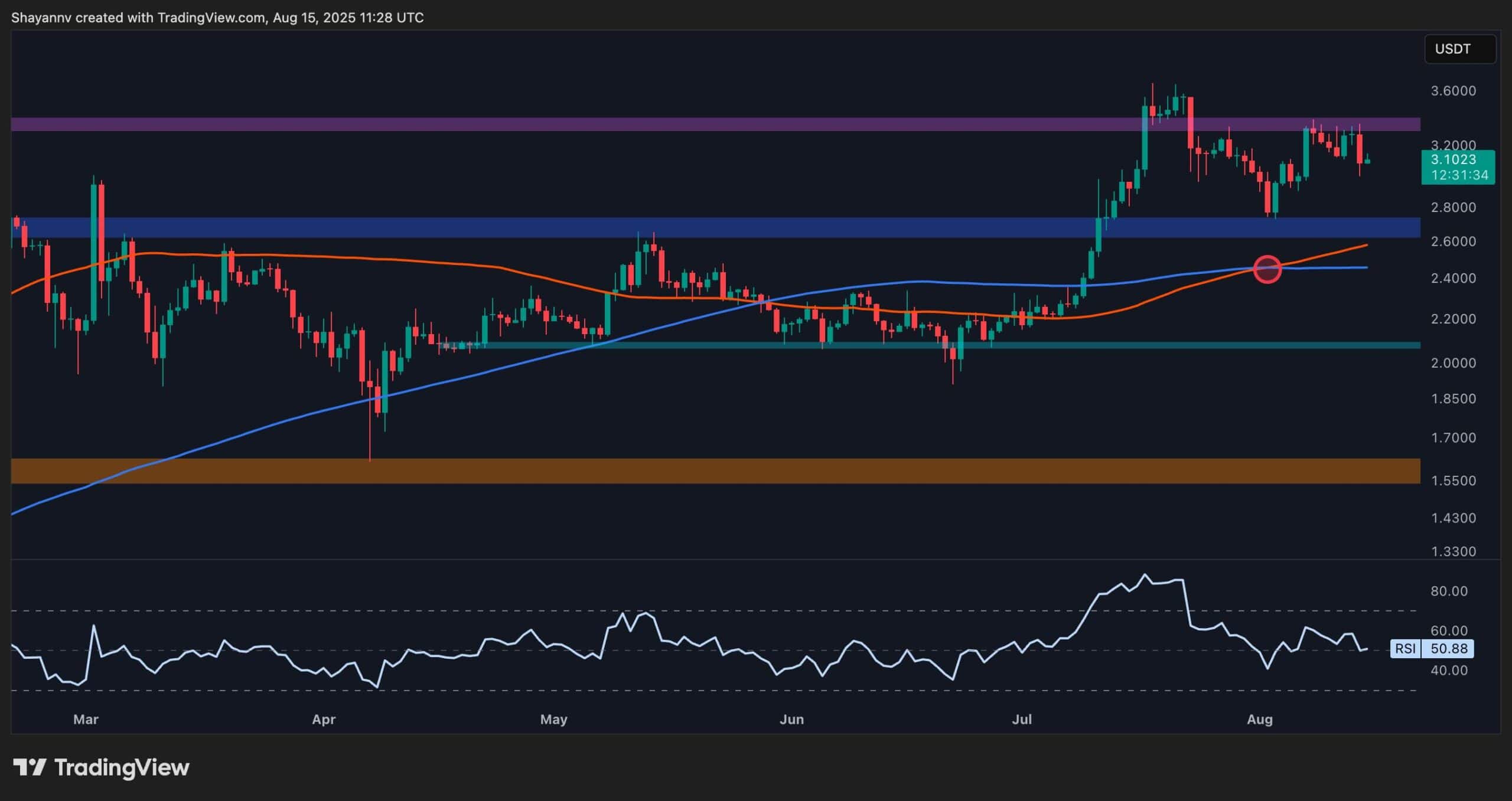Cryptocurrency
Bitcoin ETF applications: Who is filing and when the SEC may decide

The race to list the first spot-traded Bitcoin (BTC) exchange-traded fund (ETF) in the United States has seen the entrance of major financial institutions like BlackRock, Fidelity and VanEck.
While the U.S. Securities and Exchange Commission (SEC) first approved a Bitcoin-linked Futures ETF in October 2021, the current filings are for spot Bitcoin ETFs. Following Grayscale’s recent legal victory against the SEC’s review of its spot Bitcoin ETF proposal, many now believe approval of the investment funds is more likely.
The interest of BlackRock — the world’s largest asset manager with over $8 trillion worth of assets under management — prompted several other institutions to refile for a spot Bitcoin ETF.
Most of these asset managers had to either withdraw their spot Bitcoin ETF filings or face rejection due to the SEC’s reservations concerning a spot-derived ETF. Here are the key Bitcoin ETF applicants:
- BlackRock: BlackRock filed for a spot Bitcoin ETF on June 15, with Coinbase as the crypto custodian and spot market data provider and BNY Mellon as its cash custodian. The filing shocked the crypto and traditional finance world, and the firm’s CEO, Larry Fink, had previously called BTC an index for money laundering. On July 15, the SEC formally accepted BlackRock’s spot Bitcoin ETF application for review.
- WisdomTree: The New York-based asset manager first filed for a spot Bitcoin ETF in the U.S. on Dec. 8, 2021, which was rejected by the SEC in 2022. The agency claimed the ETF fell short in terms of investor protection; however, with BlackRock’s entry in the spot Bitcoin ETF race, WisdomTree refiled with the SEC on July 19.
- Valkyrie Investments: Asset management firm Valkyrie filed its first spot Bitcoin ETF application in January 2021 but faced rejection from the SEC, like many other asset managers. However, with the rejuvenated enthusiasm around a spot Bitcoin ETF, Valkyrie refiled its application on June 21. The ETF would refer to the Chicago Mercantile Exchange’s (CME) reference price for Bitcoin and trade on NYSE Arca, with Xapo as the crypto custodian.
- ARK Invest: ARK filed an application for its ARK 21Shares Bitcoin ETF in June 2021. ARK Invest has partnered with Swiss-based ETF provider 21Shares to offer the fund, and it will launch on the Chicago Board Options Exchange (Cboe) BZX Exchange under the ticker symbol ARKB if approved.
- VanEck: VanEck is one of the earliest Bitcoin ETF applicants, making its first filing in 2018. The asset manager withdrew its application in September 2019 and made a second attempt with the SEC in December 2020, with shares of the trust set to trade on the Cboe BZX Exchange. The firm filed a new application in July 2023.
- Fidelity/Wise Origin: Fidelity Investments first applied for a spot Bitcoin ETF in 2021 and refiled for its Wise Origin Bitcoin Trust on July 19, 2023. The Wise Origin Bitcoin Trust would see Fidelity Service Company serving as the administrator while Fidelity Digital Assets will act as the BTC custodian.
- Invesco Galaxy Bitcoin ETF: Invesco first filed an application for its Invesco Galaxy Bitcoin ETF jointly with Galaxy Digital on Sept. 22, 2021. The joint venture refiled its application in July. The joint Bitcoin ETF would be “physically backed” by Bitcoin, with Invesco Capital Management as the sponsor.
- Bitwise: Bitwise first filed for a spot Bitcoin ETF in October 2021, only to face rejection from the SEC. The asset manager refiled its application in August 2023.
- GlobalX: Fund manager GlobalX joined the ETF race in 2021, along with several other financial giants, when it filed for a spot Bitcoin ETF. The fund manager refiled its application in August 2023, becoming the ninth applicant. The firm named Coinbase as its surveillance-sharing partner.
In light of Grayscale’s recent legal victory and the wave of renewed applications, ETF analysts at Bloomberg have raised their expected approval chances for a spot Bitcoin ETF to 75% from 65%.
NEW: @JSeyff & I are upping our odds to 75% of spot bitcoin ETFs launching this yr (95% by end of ’24). While we factored Grayscale win into our prev 65% odds, the unanimity & decisiveness of ruling was beyond expectations and leaves SEC w “very little wiggle room” via @NYCStein pic.twitter.com/IyEGmWjuHa
— Eric Balchunas (@EricBalchunas) August 30, 2023
As expected, the SEC has delayed its decision on all seven applicants. Analysts had predicted that the SEC may not decide on an ETF until early 2024 when the final deadlines approach (listed below).

John Glover, chief investment officer at crypto lending platform Ledn, told Cointelegraph that the ARK 21Shares “verdict slated for Jan. 10 will be the first real indicator as to whether the SEC is ready to start approving these types of applications. The final deadline is up at that point, and a decision will need to be made one way or another.”
Why has the SEC rejected spot Bitcoin ETFs in the past?
In its earlier rejection of VanEck’s spot Bitcoin ETF, the SEC claimed that the Bitcoin market is not big or mature enough to sustain ETF market demand. The commission also said the price volatility and inadequate level of trading surveillance could potentially leave the market prone to fraud and manipulation.
However, with the entrance of BlackRock, market pundits have started to believe that the chances of a spot Bitcoin ETF being approved are good.
Recent: AI could revolutionize human resources, but there are risks
One of the major factors preventing a spot ETF from getting approved is the nature of the fund.
A futures ETF is based on futures contracts rather than the digital asset itself, which is an important distinction. The futures markets are already heavily regulated to prevent market manipulation, thus making it easier for the SEC to approve such ETFs.
At the heart of these spot ETF rejections is the issuer’s requirement to incorporate a “surveillance-sharing agreement” with a sufficiently large and regulated Bitcoin-related market. Such agreements are integral in ensuring that the SEC can conduct exhaustive investigations in the event of any market irregularities.
A Bitfinex Alpha analyst told Cointelegraph that one of the vital concerns behind the rejection of spot Bitcoin ETFs is the regulator’s ability to track and continuously ensure asset safety and custody. However, for that to happen, the U.S. needs more regulatory and legal infrastructure before the “SEC or other involved parties would be comfortable in allowing an ETF provider to handle it.”
“If not, then the entire purpose of an ETF (which is to circumvent dealing with digital asset wallets or crypto exchanges) is defeated. Thus, it would not be fair to say that spot Bitcoin ETFs do not propose manipulation concerns in the SEC’s eyes. The ProShares Bitcoin ETF disapproval dated back to 2018 clarifies this very point. Another concern with regard to the document’s literature was the ability of the Bitcoin market to handle the volume that would be brought in via the introduction of a spot ETF,” the analyst added.
The SEC is mainly concerned about the robustness of the trading venues. The regulator oversees futures exchanges like the CME and the Cboe, and any futures ETFs will be restricted to only trading on those regulated venues. Whereas there are no SEC-regulated spot exchanges.
However, not everyone agrees with the SEC’s assumptions about the vulnerabilities of the spot crypto ETF market. James Koutoulas, the founder of a futures-focused hedge fund Typhon, told Cointelegraph:
“I can attest that the crypto futures are far inferior to the spot in terms of tracking error. The concept that a U.S. regulator can provide adequate ‘surveillance’ against market manipulation on a global 12-figure market is delusional. So, honestly, it probably comes down to passing the buck to the CFTC rather than retaining accountability. Given the SEC has an ‘investor protection’ mandate.”
He added that by continuing to reject the simplest products like a BTC ETF, the ”SEC keeps pushing demand for crypto offshore and unregulated players. While a BTC ETF may not be perfect, it is much safer than buying BTC with Gensler’s family friend SBF [Sam Bankman-Fried] at FTX.”
Richard Gardener, CEO of tech infrastructure firm Modulus, believes futures ETFs have long been seen as more palatable for regulators and that the decision over a spot ETF is a matter of when not if.
He told Cointelegraph that a spot BTC ETF is “coming, sooner rather than later, and the heavy investment from major players like BlackRock and Fidelity signal this. As long as the major players are in the hunt, the industry is seen as viable in the long term, despite any short-term setbacks. If the SEC continues to refuse to act, politicians will be forced to act and develop their own answer to the crypto dilemma.”
Ether futures ETF have more chances of approval
While crypto enthusiasts would prefer to see spot ETFs, which would legitimize crypto as an asset class, U.S. regulators seem more likely to support futures ETFs.
Bloomberg analysts have predicted that the chances of approval for an Ether (ETH) futures-derived ETF are over 90%, with nearly a dozen institutions lined up for approval.
Magazine: How to protect your crypto in a volatile market: Bitcoin OGs and experts weigh in
Reports in financial media suggested a high possibility of the SEC approving an Ether futures-based ETF as soon as October.
This not surprising to us, we had said they would approve Ether Futures early on in race. Nice to be validated. Now what does it mean for spot? Hard to say beyond it shows that their views/policy/tolerance can change. https://t.co/JXCxNUpj2U
— Eric Balchunas (@EricBalchunas) August 17, 2023
Ken Timsit, managing director at blockchain startup accelerator Cronos Labs, told Cointelegraph that the “thesis in favor of futures is that futures would enable investors to send signals about the price evolutions expected by the market, which in turn would help to dampen the volatility of Bitcoin and Ethereum price and counterbalance the large price swings that we have seen recently.”
Doug Schwenk, CEO of Digital Asset Research, told Cointelegraph that the “near-term psychological impact would most likely give a boost to crypto markets as another proof point that regulators remain open to evolving the listed space and continued hope for the elusive spot ETF.”
Cryptocurrency
Ethereum Foundation, Whales, and Hackers: What’s Driving the ETH Sell-Off?

TL;DR
- Whales, hackers, and the Ethereum Foundation wallets moved over $500M in ETH through large sales and withdrawals.
- Ethereum transfers rose to 4.6M ETH, nearing the monthly high of 5.2M recorded in July.
- Staking inflows hit 247,900 ETH, the highest in a month, locking more supply from trading.
Large Withdrawals and Whale Activity
Ethereum (ETH) has seen heavy movement from major wallets over the past few days. On-chain data from Lookonchain shows a newly created wallet pulled 17,591 ETH, worth $81.62 million, from Kraken in just two hours.
Over three days, two new wallets withdrew a combined 71,025 ETH, valued at $330 million, from the exchange.
One of these wallets, address 0x2A92, has withdrawn 53,434 ETH, worth $242.34 million, in two days. This includes a recent purchase of 30,069 ETH, valued at $138.46 million, during a market drop.
Major ETH Holders Offload Millions Amid Price Rally
In contrast, several separate entities have been disposing of some ETH holdings. A wallet tied to a hacker address 0x17E0 sold 4,958 ETH for $22.13 million at $4,463, securing a profit of $9.75 million. Earlier this year, the same address sold 12,282 ETH at $1,932 and later bought back part of the amount at higher prices.
A different whale sold 20,600 ETH for $96.55 million over the past two days, generating a profit of more than $26 million after holding the position for nine months.
Meanwhile, an Ethereum Foundation-linked wallet, 0xF39d, sold 6,194 ETH worth $28.36 million in the last three days at an average price of $4,578.
Recent sales from the same wallet included an additional 1,100 ETH and 1,695 ETH for over $12.7 million combined.
The #EthereumFoundation-linked wallet(0xF39d) sold another 1,300 $ETH($5.87M) at $4,518 ~11 hours ago.
Over the past 3 days, this wallet has sold a total of 6,194 $ETH($28.36M) at an average price of $4,578.https://t.co/4hfCWymHVG pic.twitter.com/ErUyEY8SJy
— Lookonchain (@lookonchain) August 15, 2025
Network Activity on the Rise
CryptoQuant data shows Ethereum’s total tokens transferred have been climbing since August 9. After ranging between 1 million and 3 million ETH through late July and early August, transfers have risen to 4.6 million ETH, approaching the monthly high of 5.2 million recorded in mid-July. This increase has occurred alongside a price rally from about $3,400 to $4,600.
Interestingly, staking inflows generally stayed between 20,000 and 80,000 ETH per day over the past month. On August 14, inflows jumped to 247,900 ETH, the highest in the period.
At the time, ETH was trading near $4,600. Large staking deposits reduce the amount of ETH available for immediate trading, as staked coins are locked for a set period.
In the meantime, ETH trades at $4,647 with a 24-hour volume of $68.25 billion, down 2% on the day but up 19% over the week.
Binance Free $600 (CryptoPotato Exclusive): Use this link to register a new account and receive $600 exclusive welcome offer on Binance (full details).
LIMITED OFFER for CryptoPotato readers at Bybit: Use this link to register and open a $500 FREE position on any coin!
Cryptocurrency
Massive DOGE Whale Activity Hints at $1 Breakout

TL;DR
- Whales bought two billion DOGE this week, lifting their combined holdings to 27.6 billion coins.
- A single 900M DOGE transfer worth $208M to Binance drew attention to large exchange movements.
- DOGE broke key resistance, with momentum building for a possible push toward the $1 price mark.
Price and Market Moves
Dogecoin (DOGE) traded at $0.23 at press time, slipping 4% over the past day but still showing a 2% gain for the week. Daily turnover came in at about $6.18 billion.
Meanwhile, the broader crypto market saw over $1 billion in liquidations. Hotter-than-expected US Producer Price Index data pushed traders to scale back expectations of a near-term Federal Reserve rate cut. DOGE had roughly 290,500 coins liquidated during the sell-off.
On the two-week chart, analyst Trader Tardigrade notes that DOGE has cleared a downward-sloping resistance line after completing what appears to be a “wave V” in an Elliott Wave sequence. Similar setups in the past, where prolonged declines stayed within falling channels before breaking higher, have been followed by sharp rallies.
$Doge/2-week#Dogecoin is gaining strong momentum to surge above $1 pic.twitter.com/TuSEKr19nv
— Trader Tardigrade (@TATrader_Alan) August 15, 2025
Momentum gauges are also turning up. The Stochastic RSI, which had dropped into oversold territory, is now heading higher. Previous reversals from this zone have coincided with sustained upward moves. The current formation points to a possible run that could carry DOGE past the $1 mark.
Heavy Whale Buying and Large Transfers
As reported by CryptoPotato, blockchain data shows large investors have added two billion DOGE in the past week, spending just under $500 million. That brings their holdings to about 27.6 billion coins, or 18% of the supply. The buying streak has prompted speculation within the community.
Recently, Whale Alert flagged a 900 million DOGE transfer worth about $208 million into Binance. The tracking indicates that it originated from a wallet connected to the exchange, likely as an internal activity. The address involved holds 2.88 billion DOGE, one of the largest balances on the network.
Ali Martinez also reports that transactions above $1 million reached a one-month high, with activity building since early August and peaking as DOGE traded at $0.25.
Whales are back! Dogecoin $DOGE activity at a 1-month high. pic.twitter.com/C83Pv68mCt
— Ali (@ali_charts) August 14, 2025
Sentiment Building
Analyst Gordon described the current setup as “a nice bit of consolidation” before a potential breakout, adding,
“This will be one of the first coins normies FLOCK to & the pump will be MASSIVE.”
With whale accumulation rising, high-value transfers increasing, and a bullish technical pattern in play, DOGE is positioned for a potential push toward $1 if momentum holds.
Binance Free $600 (CryptoPotato Exclusive): Use this link to register a new account and receive $600 exclusive welcome offer on Binance (full details).
LIMITED OFFER for CryptoPotato readers at Bybit: Use this link to register and open a $500 FREE position on any coin!
Cryptocurrency
Ripple Price Analysis: XRP at Risk as Key Support Levels Could Trigger Sharp Drop

XRP has recently entered a consolidation phase after a strong rally earlier this summer, with the price action now hovering around key resistance levels on both its USDT and BTC pairs. Yet, while momentum has slowed, the charts still indicate a generally bullish structure, with multiple key support levels remaining firmly in place.
Technical Analysis
By ShayanMarkets
The USDT Pair
On the XRP/USDT daily chart, the price is currently trading near the $3.10 mark, facing a strong resistance zone around $3.40. This follows a breakout above the $2.70 range in July, which has now flipped into a support area.
Both the 100-day and 200-day moving averages are also trending upward and recently formed a bullish crossover around $2.45, reinforcing the medium-term bullish sentiment. If the $3.40 resistance breaks, a push toward the critical $4.00 range becomes likely.
However, the RSI hovering near the neutral 50 level suggests a lack of strong momentum for now, meaning a short-term pullback into the $2.80 support zone is still possible.
This zone will be key for maintaining the bullish structure. Losing it could open the door for a deeper correction toward the 200-day moving average located around the $2.40 mark. Yet, as long as the price stays above the moving averages, the broader trend remains bullish.
The BTC Pair
Looking at the XRP/BTC chart, the pair has recently pulled back after hitting the 3,000 SAT resistance, with the price currently around 2,600 SAT.
This follows a clean breakout above the long-term descending channel and a successful retest of its upper boundary, which coincided with the 200-day moving average and the 2,400 SAT support zone. This confluence remains a key bullish technical factor, as holding above it could attract renewed buying pressure.
That said, RSI levels around 48 show that momentum has cooled after the sharp July rally, meaning XRP may continue ranging between 2,400 SAT and 3,000 SAT in the near term. A decisive close above 3,000 SAT would likely open the path to the 3,400 SAT zone, while losing 2,400 SAT could shift the bias back toward 2,000 SAT support. For now, the structure still favors the bulls as long as higher lows remain intact.
Binance Free $600 (CryptoPotato Exclusive): Use this link to register a new account and receive $600 exclusive welcome offer on Binance (full details).
LIMITED OFFER for CryptoPotato readers at Bybit: Use this link to register and open a $500 FREE position on any coin!
Disclaimer: Information found on CryptoPotato is those of writers quoted. It does not represent the opinions of CryptoPotato on whether to buy, sell, or hold any investments. You are advised to conduct your own research before making any investment decisions. Use provided information at your own risk. See Disclaimer for more information.
Cryptocurrency charts by TradingView.

 Forex3 years ago
Forex3 years agoForex Today: the dollar is gaining strength amid gloomy sentiment at the start of the Fed’s week

 Forex3 years ago
Forex3 years agoUnbiased review of Pocket Option broker

 Forex3 years ago
Forex3 years agoDollar to pound sterling exchange rate today: Pound plummeted to its lowest since 1985

 Forex3 years ago
Forex3 years agoHow is the Australian dollar doing today?

 Cryptocurrency3 years ago
Cryptocurrency3 years agoWhat happened in the crypto market – current events today

 World3 years ago
World3 years agoWhy are modern video games an art form?

 Commodities3 years ago
Commodities3 years agoCopper continues to fall in price on expectations of lower demand in China

 Economy3 years ago
Economy3 years agoCrude oil tankers double in price due to EU anti-Russian sanctions





















